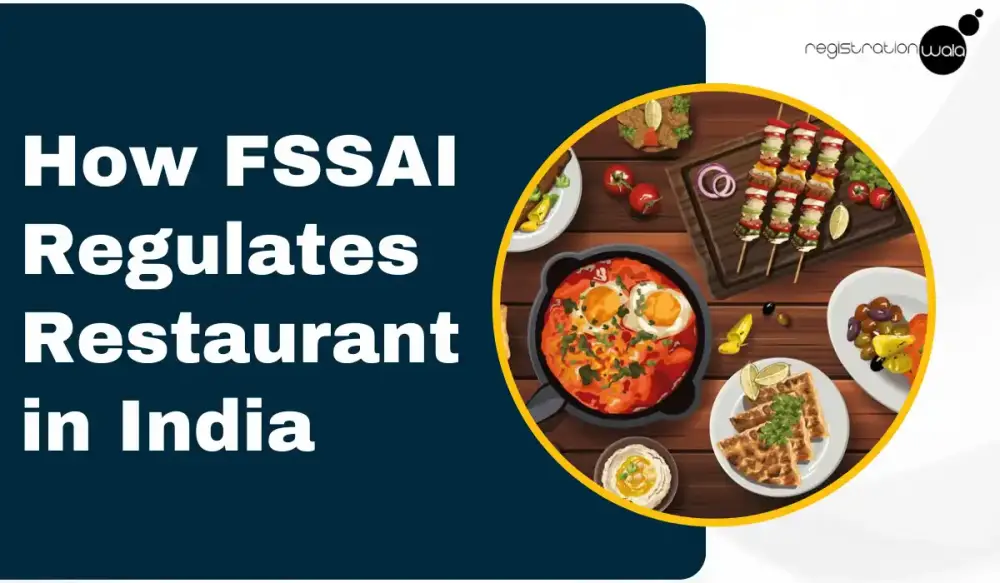How FSSAI Ensures Food Safety in Indian Restaurants
- May 30, 2016
- Registrationwala

- Home
- /
- Knowledge Base
- /
- Business Registrations
- /
- FSSAI Registration
- /
- How FSSAI Ensures Food Safety in Indian Restaurants
How FSSAI Ensures Food Safety in Indian Restaurants
Everyone loves to eat delicious food, but whenever someone takes a bite of delicious food, who makes sure the food is safe? To answer this question, the Food Safety and Standard Authority of India (FSSAI) ensures this. FSSAI is a government authority responsible for regulating the food industry and making sure the food being sold, served and distributed to consumers is safe for human consumption.
For this, FSSAI (Food Safety and Standards Authority of India) rules have been laid down by the authority. To protect and promote public health through regulation and supervision of food safety, FSSAI plays an irreplaceable role. It grants FSSAI license to eateries like cafes and restaurants, so that they are legally authorized to sell and serve food to their customers. Let’s discuss how FSSAI regulates restaurant business in India in depth through this article.
About FSSAI & Its Role in Regulating Eateries
FSSAI was set up under the Food Safety and Standards Act (FSS) Act of 2006. So, the authority has been around for nearly two decades. The Ministry of Health and Family Welfare, Government of India administers this authority.
All food businesses, including restaurants, bakeries, cafes, momo stalls, etc. are required to obtain a FSSAI license containing a 14-digit number. All of them are required to comply with the regulations and rules under the FSS Act to ensure food safety and hygiene.
FSSAI prescribes standard for processing of foods, and separate packaging and labeling regulations which require that every food package must contain essential details such as name of food, list of ingredients, nutritional information, declaration regarding vegetarian and non-vegetarian item, etc. in order to maintain transparency amongst customers who are health conscious, allergic to certain ingredients, etc.
The FSSAI rules and regulations are especially important in this era where most of us have an extremely busy lifestyle and do not realize how our health deteriorates day by day. Many individuals now frequently eat their one-time meal at restaurants, particularly those who live far from home. As a result, having a regulating authority like the FSSAI that can monitor the restaurant is crucial. Due to FSSAI guidelines and efforts, the cases of food adulteration and food poisoning have reduced in number.
By implementing stringent rules and regulations, FSSAI ensures the food safety from farm to plate. The rules and regulations compel the restaurant owners to pay attention to food safety.
Penalty & Offences under FSSAI regulation
Here are some penalties and offenses in case of violation of standards and rules established by FSSAI:
-
Not having FSSAI license: If any person who is required to obtain FSSAI license but still chooses to run his Food Business without this license shall be punished with imprisonment for a term which may extend to 6 months and also with fine which may extend to Rs. 5 lakh.
-
Food Quality issues: Penalty shall be levied up to Rs. 5 lakh if food sold by the Food business does not match the required quality standard prescribed by FSSAI.
-
Substandard food: Selling substandard food may attract a penalty up to Rs. 5 lakh.
-
Injury or death of consumer:
-
In case of death: Imprisonment of not less than 7 years + penalty of not less than Rs. 10 lakh.
-
In case of grievous injuries: A penalty of Rs. 5 lakh and 6 years of imprisonment as retribution
-
In case of non-grievous injury: The penalty is up to Rs. 3 lakh.
Conclusion
FSSAI plays an important role in regulating and supervising not only restaurants, but the entire food industry. All the food businesses in India must ensure their compliance with the guidelines and standards established by the authority. Failing to comply with them can lead to penalties and fines or cancellation of FSSAI registration. In some cases, food business owners might have to shut down their food business forever.
Want to obtain FSSAI registration for your restaurant? Connect with Registrationwala.
Frequently Asked Questions (FAQs)
Q1. Which authority issues the food license for restaurant?
A. The Food Safety and Standard Authority of India (FSSAI) issues the food license for restaurants in India.
Q2. What is the purpose of FSSAI guidelines for restaurants?
A. The purpose of FSSAI guidelines for restaurant business is to ensure food safety, quality and hygiene of food products so that consumers can consume the food without any worries.
Q3. Which Ministry establishes food laws India?
A. The Ministry of Health & Family Welfare, through FSSAI, establishes food laws in India.
Post updated on: 16-10-2024
- 3125 views
